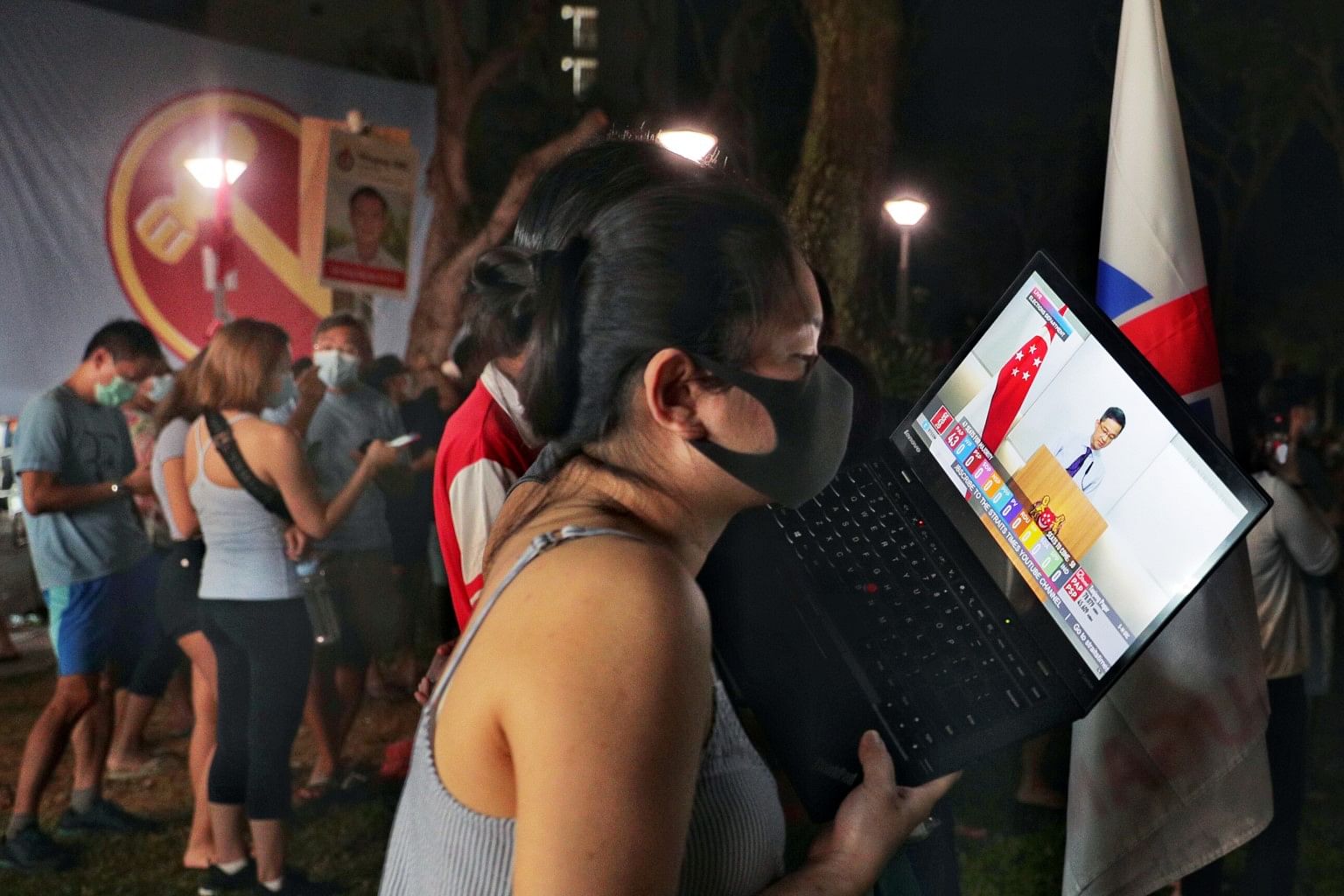GE2020 was a good result for Singapore. It showed a sophisticated and mature electorate which returned the ruling party to power but with a clear message that it had issues with some of its policies and style of government.
Voters had an equally strong point to make to the opposition: We hear you about not giving the Government a blank cheque but you have to work very hard to prove that you are up to the task.
It was a hard slog for many of the opposition parties and their candidates as it has always been battling the People's Action Party. GE2020 showed it still is but that it is possible to make some headway.
The key to the opposition's success?
Surprise, surprise, it is exactly the same as the PAP's: Sound leadership at the top with a clear plan on how to grow and strengthen the party.
The Workers' Party, with Mr Pritam Singh helming it for the first time, made several key moves that proved decisive.
It focused on its stomping ground in the east, with fewer candidates than in the last general election with a younger line-up than the other parties and campaigned single-mindedly to deny the PAP a clean sweep.
It could have gone seriously wrong for the party forced to field fresh faces in Aljunied GRC with the retirement of its former chief Low Thia Khiang, and with Deputy Prime Minister Heng Swee Keat's surprise move to East Coast GRC.
But the WP did not allow these to disrupt its campaign plan and messaging.
Sticking close to the script required firm leadership at the top and discipline from party members on the ground.
These two qualities were evident too in how it handled the controversy over Ms Raeesah Khan's Facebook postings, nipping the problem in the bud quickly and unambiguously.
The Progress Singapore Party (PSP), which performed creditably as a new party despite not winning a single seat, would do well to follow the WP's example if it wants to be as successful.
It was a good result for Singapore because no one knows how the political landscape will change with a younger electorate who want a greater say in how the country is run: Will it be a gradual and stable transition to a more pluralistic polity or a precipitous change to an uncertain future?
With the WP winning just one more GRC and the other parties returning empty-handed, Singaporeans voted for slow and steady change.
That's a resounding vote for a stable Singapore.
Will it always be like this?
It depends on how the ruling party deals with several issues which GE2020 highlighted.
There are three.
First, and most important, is the ongoing transition to the 4G leadership.
This GE was meant to be a political test of their readiness to take over. If the PAP had scored an overwhelming win similar to what it achieved in 2015, it would have proclaimed the transition a success and proceeded as planned.
How will the party assess leadership succession now, faced with a nationwide 8.7 percentage point swing against it?
I believe it should review its decision, and not just because of GE2020.
The selection of DPM Heng to succeed PM Lee Hsien Loong was made by his 4G colleagues prior to the Covid-19 pandemic.

But the world has changed since and the challenges that Singapore faces now and for some time to come have become more severe and uncertain.
Will the new circumstances require a different leader to rally and mobilise the people?
The ruling party should review the issue and obtain a fresh mandate from its members.
Indeed, many observers pointed out correctly that PM Lee, in his national broadcast on June 7, had hinted that he and his 3G colleagues might stay on longer than planned to see Singapore through the crisis.
If the timing of the handover changes, should there also be a change of leader?
It might well be that when they do review the matter, Mr Heng will again be reaffirmed by his colleagues as the top choice.
This will be a good outcome for the party because it is the least unsettling and he would benefit from the reconfirmation.
But if the party decides differently, it has to move quickly to make the change.
In making this call, I am not suggesting that Mr Heng's claim to the leadership has been damaged by his team's performance in East Coast GRC where it met a WP team.
In fact, the swing against the PAP there was seven percentage points, lower than the national average of nearly nine points. Other PAP leaders such as Mr Chan Chun Sing saw a sharper 14 percentage point swing at his Tanjong Pagar GRC, against a PSP team.
Several other 4G leaders also saw several point drops in the share of votes for the PAP slates they led, and generally, the fall was much sharper where they were up against strong opponents from the WP or PSP.
I am more concerned about how much the world has changed, and therefore it is important to re-examine all the previous assumptions, including on leadership.
The second major issue that GE2020 highlighted is an equally critical one: How to win over younger voters.
About 55 per cent of Singaporeans are under 45, and in constituencies like Sengkang, they make up 60 per cent of voters.
One key to being relevant is obviously to field candidates in sync with voters, and the WP's winning slate in Sengkang demonstrates this reality.
To be fair to the PAP, it too has done likewise with younger candidates.
But it is only half the story.
Equally important is your position and policy on issues that matter to the young. This is a large question affecting many areas and I will cite just one: Race.
Every survey has shown that young Singaporeans have a more liberal and enlightened attitude towards race and are more accepting of people of different races.
They are less likely to agree, for example, with the ruling party's stand that Singapore is not ready for a non-Chinese prime minister.
When the PAP continues to hold this line, the young hear the message loud and clear: You are not listening to me.
In contrast, the WP is led by an Indian, and so is the chairman of the Singapore Democratic Party.
Should it surprise anyone if opposition parties appear to young voters as more appealing and less constrained by dated thinking?
Another old slogan that needs overhauling: That the PAP needs a strong mandate to govern.
Most people would agree with this, but how strong it needs to be will be different between a young voter compared with a 60-year-old baby boomer.
The party needs a more sophisticated and nuanced approach, especially in a new social media environment where you have to respond quickly to feedback and changing circumstances.
Is the PAP nimble and flexible enough to make these changes?
This is not about policy, but about mindset and governing style, which brings me to my third point.
The PAP has not changed its fundamental approach, which is top down and technocratic.
Over the last few years, it has made several unpopular decisions that reinforce this perception, including the reserved presidency, the impending increase in the goods and services tax, new laws on fake news, and its uncompromising stance on critics and dissenters.
It used to be said that the Government was not afraid to make unpopular decisions because voters will judge it over a five-year period, especially over whether it has delivered the good life.
Two things have happened to change this equation.
First, the good life is no longer as assured as it was in the earlier years when near double-digit economic growth was normal.
Now, 3 per cent is considered outstanding.
Second, the electorate, especially the young, no longer view such a paternalistic approach as tough love. More likely, it is seen as being high-handed and out of touch.
In effect, they want a PAP-lite, minus the hard edges that are part of the party's DNA.
Can it evolve into such a party and will the change be good for Singapore?
That is one of the defining questions of GE2020.
GE2020 in numbers
Number of votes cast: 2,535,565
Voter turnout: 95.63%
Number of rejected votes: 45,772
Largest percentage of spoilt votes Radin Mas SMC: 3.47%
Biggest winning percentage Jurong GRC (PAP v RDU): 74.62%
Smallest winning percentage West Coast GRC (PAP v PSP): 51.69%
Age of youngest winning candidate Ms Raeesah Khan (Sengkang GRC): 26
Age of oldest winning candidate PM Lee Hsien Loong (Ang Mo Kio GRC): 68
- The writer is also senior fellow at the S. Rajaratnam School of International Studies, Nanyang Technological University.


